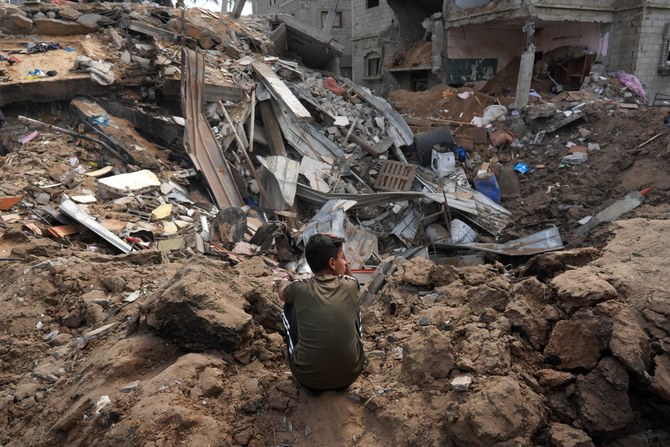
After more than seven months of the most horrific and relentless bombardment of Gaza, resulting in more than 35,000 Palestinian dead and 10,000 missing, one nagging question is now haunting Israeli leaders and their Western allies: Can Israel defeat Hamas, thus bringing an end to this costly war?
Israel last month withdrew most of its ground forces from Gaza for “tactical reasons,” having overrun northern and central Gaza and pushed more than 1.2 million inhabitants toward the south, especially the border town of Rafah. It claimed that it had cleared Gaza City and Jabalia refugee camp, as well as the city of Khan Yunis, of Hamas fighters. Israeli Prime Minister Benjamin Netanyahu boasted that his army had wiped out 20 of Hamas’ 24 battalions and that it needed to launch a ground offensive on Rafah to finish off the remaining four.
For weeks, the US and Israel’s Western allies warned against an Israeli ground offensive in the heavily populated Rafah. The US wanted to see plans for the evacuation of civilians and to receive assurances that Israel would take measures to protect those fleeing. But Netanyahu was defiant, claiming victory was within reach and that taking Rafah would secure it.
Then, last week, the Israeli army began shelling the city’s parameters while ordering residents, mostly displaced people, to head to the north and east to so-called safe areas. Days later, its troops stormed the Rafah border crossing with Egypt and raised the Israeli flag there, prompting Cairo to suspend aid shipments and refuse to coordinate with Tel Aviv.
Instead of victory, the defeat of Hamas and the return of hostages, Israel now finds itself trapped in a costly war of attrition
Osama Al-Sharif
But while Israel was focusing on Rafah, resistance fighters launched rockets from Jabalia in northern Gaza, forcing Israel to resume shelling of the area and redirect ground forces back to the north. By Sunday, gruesome images and footage of Palestinian dead and injured were coming from Jabalia once more. Thousands of hapless civilians were running for their lives — again — this time with nowhere to go.
Israel admitted that Hamas fighters were regrouping in the north while heavy fighting was taking place in almost all parts of the beleaguered Gaza Strip. The war was no closer to an end, just like a few months before. Netanyahu is looking for a finish line that does not exist.
What we know is that Israel has killed tens of thousands of civilians, injured many more and destroyed hospitals, schools, universities, mosques and churches. We do not know how many of the resistance fighters it has killed and how close it is to concluding the war and declaring victory.
But while Netanyahu was still discussing an existential war that must be won, strong words came from US Secretary of State Antony Blinken on Sunday. Speaking to US TV networks, Blinken said that Israeli tactics had resulted in “a horrible loss of life of innocent civilians,” while failing to neutralize Hamas leaders and fighters, who could wage a lasting insurgency. He added that the US had worked with Arab countries and others for weeks on developing “credible plans for security, for governance, for rebuilding’’ in Gaza, but “we haven’t seen that come from Israel ... We need to see that, too.”
Instead of victory, the defeat of Hamas and the return of hostages, Israel now finds itself trapped in a costly war of attrition, facing a “lasting insurgency.” While the Biden administration continues to support Israel militarily — the temporary suspension of a delivery of 2,000-pound dumb bombs notwithstanding — it is clear that the White House is fed up with Netanyahu’s prevarication and his recent derailment of a ceasefire deal. This agreement, worked out by the Egyptians, the Qataris and the Americans and accepted by Hamas, would have stopped the bloodletting and secured the return of the Israeli captives.
On Monday, Jacob Lew, the US ambassador to Israel, defended US-Israel ties. However, when asked if the Biden administration still sees the elimination of Hamas as the primary goal of the war, he said: “We have learned from our experience in difficult wars that there is a difference between eliminating something and making it no longer a threat, and the challenge is to weaken Hamas to the point where it is no longer a threat.” He added that the common goal was “to defeat Hamas, locate the leaders of Hamas and close the border to smuggling in both directions. Our common interest here is broad.”
However, the Israeli and American goals may differ from those of Netanyahu. His idea of victory, finishing off Hamas and other resistance movements completely, is proving impossible to achieve after more than seven months of fighting. The Israeli army is facing a war of attrition and an insurgency that could last years. The cost will prove to be too high for Israelis, Palestinian civilians and the rest of the world.
A long war favors the defenders, while an invading army can quickly lose its way in a protracted conflict
Osama Al-Sharif
If Netanyahu is hedging his bets, waiting for November’s US presidential election and a possible Donald Trump victory, he will be making a grave mistake. Trump would be able to do little to outbid Biden in terms of supporting Israel militarily. And he would be condemning the remainder of the Israeli captives to certain death.
This is a war fought not against regular armies but guerilla fighters who can outlast and outmaneuver soldiers in armored vehicles in urban areas. The fighters do not rely on centralized command and control structures and can defend their territories independently. They are motivated and able to regroup, surviving on limited munitions.
Blinken’s reference to insurgencies is essential. The US fought the Taliban for 20 years and lost. The Soviet Union battled the mujahedeen in Afghanistan for more than a decade and was eventually repulsed. A long war favors the defenders, while an invading army can quickly lose its way in a protracted conflict.
Added to this is the fact that the war is taking a toll on Israelis, who are frustrated with the government’s handling of the conflict and its failure to deliver a decisive conclusion. Meanwhile, hundreds of thousands of Israelis remain displaced in the north and south of the country. The Israeli economy is suffering and the country has already lost its war in the court of global public opinion. The geopolitical reverberations of the war on Gaza have shaken the foundations of Western democracies and are testing the credibility of the international rules-based order.
Netanyahu should accept that his war in Gaza has come to an end. His army will never deliver the victory he has been espousing. A day-after scenario, or multiple scenarios, is what should be discussed today, in which Israel must first withdraw from the Strip and allow the unfettered flow of humanitarian aid. Who rules Gaza next and how is the real question. The future of Hamas as a political entity under the Palestine Liberation Organization’s umbrella is now a must. More importantly, the international community must push for a political process that ends the Israeli occupation and allows for the creation of a Palestinian state.
Such proposals are anathema to Netanyahu and his far-right cohorts. But the world cannot go back to the day before Oct. 7, both for Israelis and Palestinians. This is as much for Israel’s survival as it is for the Palestinians.
Osama Al-Sharif is a journalist and political commentator based in Amman. X: @plato010












